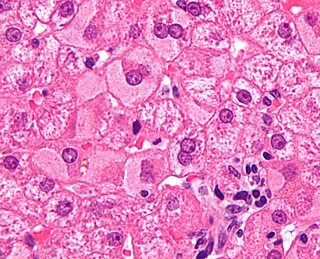Innogenetics N.V. (now Fujirebio Europe N.V.) was an international in vitro diagnostics (IVD) company, with headquarters in Ghent, Belgium. Founded in 1985, the company developed and marketed IVD testing solutions as well as OEM raw materials. The company was acquired in September 2010 by Japanese Fujirebio Inc., an H.U. Group Holdings, Inc company, and changed name to Fujirebio Europe on October 1, 2013. The current CEO of Fujirebio Europe N.V. is Christiaan De Wilde.
Innogenetics was founded on 18 July 1985, by Erik Tambuyzer, Hugo Van Heuverswyn and Rudi Mariën. In 1992, the company launched the first commercial tests for cystic fibrosis in Europe (INNO-LiPA CFTR) and in 1993 the first commercial test for Hepatitis C virus (HCV) genotyping worldwide (INNO-LiPA HCV). In 1995, the first commercial Alzheimer's disease research test for hTau was launched (INNOTEST hTau Ag). In 1998, the company launched the first commercial Alzheimer's disease research test for β-Amyloid and in 2002 the first commercial test for Hepatitis B virus (HBV) genotyping (INNO-LiPA HBV Genotyping).
The company was one of the first biotech companies to be listed on a European stock exchange, in 1996 it was the first biotech company listed on EASDAQ, now NASDAQ Europe. Until 2008 Innogenetics had its shares traded on Euronext Brussels.
Innogenetics N.V. was acquired by Fujirebio in 2010 and changed name to Fujirebio Europe N.V. on October 1, 2013.

Hepatitis is inflammation of the liver tissue. Some people or animals with hepatitis have no symptoms, whereas others develop yellow discoloration of the skin and whites of the eyes (jaundice), poor appetite, vomiting, tiredness, abdominal pain, and diarrhea. Hepatitis is acute if it resolves within six months, and chronic if it lasts longer than six months. Acute hepatitis can resolve on its own, progress to chronic hepatitis, or (rarely) result in acute liver failure. Chronic hepatitis may progress to scarring of the liver (cirrhosis), liver failure, and liver cancer.

Hepatitis C is an infectious disease caused by the hepatitis C virus (HCV) that primarily affects the liver; it is a type of viral hepatitis. During the initial infection period, people often have mild or no symptoms. Early symptoms can include fever, dark urine, abdominal pain, and yellow tinged skin. The virus persists in the liver, becoming chronic, in about 70% of those initially infected. Early on, chronic infection typically has no symptoms. Over many years however, it often leads to liver disease and occasionally cirrhosis. In some cases, those with cirrhosis will develop serious complications such as liver failure, liver cancer, or dilated blood vessels in the esophagus and stomach.
Hepatitis D is a type of viral hepatitis caused by the hepatitis delta virus (HDV). HDV is one of five known hepatitis viruses: A, B, C, D, and E. HDV is considered to be a satellite because it can propagate only in the presence of the hepatitis B virus (HBV). Transmission of HDV can occur either via simultaneous infection with HBV (coinfection) or superimposed on chronic hepatitis B or hepatitis B carrier state (superinfection).

Viral hepatitis is liver inflammation due to a viral infection. It may present in acute form as a recent infection with relatively rapid onset, or in chronic form.

The hepatitis C virus (HCV) is a small, enveloped, positive-sense single-stranded RNA virus of the family Flaviviridae. The hepatitis C virus is the cause of hepatitis C and some cancers such as liver cancer and lymphomas in humans.

Chiron Corporation was an American multinational biotechnology firm founded in 1981, based in Emeryville, California, that was acquired by Novartis on April 20, 2006. It had offices and facilities in eighteen countries on five continents. Chiron's business and research was in three main areas: biopharmaceuticals, vaccines, and blood testing. Chiron's vaccines and blood testing units were combined to form Novartis Vaccines and Diagnostics, while Chiron BioPharmaceuticals was integrated into Novartis Pharmaceuticals. In 2014, Novartis completed the sale of its blood transfusion diagnostics unit to Grifols and announced agreements for the sale of its vaccines unit to GlaxoSmithKline.
C.H. Boehringer Sohn AG & Co. KG is the parent company of the Boehringer Ingelheim group, which was founded in 1885 by Albert Boehringer (1861–1939) in Ingelheim am Rhein, Germany. As of 2018, Boehringer Ingelheim is one of the world's largest pharmaceutical companies, and the largest private one. Headquartered in Ingelheim, it operates globally with 146 affiliates and more than 47,700 employees. Unlike most large pharmaceutical companies which are listed, the company is private and fully owned by the Boehringer, Liebrecht and von Baumbach families. The company's key areas of interest are: respiratory diseases, metabolism, immunology, oncology and diseases of the central nervous system. Boehringer Ingelheim is a full member of the European Federation of Pharmaceutical Industries and Associations (EFPIA). The corporate logo of Boehringer Ingelheim depicts a stylized rendition of the central section of the imperial palace of Charlemagne.
Human Immunodeficiency Virus (HIV) and Hepatitis C Virus (HCV) co-infection is a multi-faceted, chronic condition that significantly impacts public health. According to the World Health Organization (WHO), 2 to 15% of those infected with HIV are also affected by HCV, increasing their risk of morbidity and mortality due to accelerated liver disease. The burden of co-infection is especially high in certain high-risk groups, such as intravenous drug users and men who have sex with men. These individuals who are HIV-positive are commonly co-infected with HCV due to shared routes of transmission including, but not limited to, exposure to HIV-positive blood, sexual intercourse, and passage of the Hepatitis C virus from mother to infant during childbirth.

Hepatitis B is an infectious disease caused by the Hepatitis B virus (HBV) that affects the liver; it is a type of viral hepatitis. It can cause both acute and chronic infection.
Fujirebio is a Japanese multinational biotechnology company, founded and headquartered in Tokyo, Japan, and present locally with offices in Japan, Asia, Europe and the United States and through a large international distribution network. The company has manufacturing facilities in Japan, Europe and the United States.
A hepatitis C vaccine, a vaccine capable of protecting against the hepatitis C virus (HCV), is not yet available. Although vaccines exist for hepatitis A and hepatitis B, development of an HCV vaccine has presented challenges. No vaccine is currently available, but several vaccines are currently under development.

Hepatitis B virus (HBV) is a partially double-stranded DNA virus, a species of the genus Orthohepadnavirus and a member of the Hepadnaviridae family of viruses. This virus causes the disease hepatitis B.
The transmission of hepadnaviruses between their natural hosts, humans, non-human primates, and birds, including intra-species host transmission and cross-species transmission, is a topic of study in virology.

Simeprevir, sold under the brand name Olysio among others, is a medication used in combination with other medications for the treatment of hepatitis C. It is specifically used for hepatitis C genotype 1 and 4. Medications it is used with include sofosbuvir or ribavirin and peginterferon-alfa. Cure rates are in 80s to 90s percent. It may be used in those who also have HIV/AIDS. It is taken by mouth once daily for typically 12 weeks.

Ombitasvir is an antiviral drug for the treatment of hepatitis C virus (HCV) infection by AbbVie. In the United States, it is approved by the Food and Drug Administration for use in combination with paritaprevir, ritonavir and dasabuvir in the product Viekira Pak for the treatment of HCV genotype 1, and with paritaprevir and ritonavir in the product Technivie for the treatment of HCV genotype 4.

Ledipasvir/sofosbuvir, sold under the trade name Harvoni among others, is a medication used to treat hepatitis C. It is a fixed-dose combination of ledipasvir and sofosbuvir. Cure rates are 94% to 99% in people infected with hepatitis C virus (HCV) genotype 1. Some evidence also supports use in HCV genotype 3 and 4. It is taken daily by mouth for 8–24 weeks.

Narlaprevir, is an inhibitor of NS3/4A serine protease, intended for the treatment of chronic hepatitis C caused by genotype 1 virus in combination with other antiviral drugs.
Hepatitis C virus (HCV) genotypes refer to the genetic variations that occurs in the hepatitis C virus. Hepatitis C is a contagious disease that primarily affects the liver, causing severe damage as the disease progresses. It is caused by the Hepatitis C virus, a small, enveloped RNA virus. The transmission of hepatitis C is through the contact with the blood of the infected person, for example by sharing the needles or by using non-sterile medical equipment. HCV is transmitted globally because of the high infection rate and is also associated with a high mortality rate. The World Health Organization indicates the 3.3% of the world population is infected by the HCV virus. Statistical records show that there are about 13 million HCV affected persons in Сhina, 3.5 million affected persons in the United States, and about 10 million people are affected by HCV in Pakistan. In all cases, the viral genotype of the HCV stays the same, occasionally mutations do occur making the treatment more complex by targeting the changes in the genotype. Hepatitis C virus genotype is considered more common than the Hepatitis B virus infection contributing to more than a million cases annually and is considered one of the major reason for liver transplantation in United States. Some of the HCV genotypes may develop in people without symptoms leading to dangerous conditions like liver cirrhosis causing a permanent damage to liver and the unnoticed HCV conditions will affect brain, joints, blood vessels, bones, and kidneys.
Sofosbuvir/velpatasvir, sold under the brand name Epclusa among others, is a fixed-dose combination medication for the treatment of hepatitis C in adults. It combines sofosbuvir and velpatasvir. It is more than 90% effective for hepatitis C genotypes one through six. It also works for hepatitis C in those who also have cirrhosis or HIV/AIDS. It is taken by mouth.

Interferon lambda 4 is one of the most recently discovered human genes and the newest addition to the interferon lambda protein family. This gene encodes the IFNL4 protein, which is involved in immune response to viral infection.